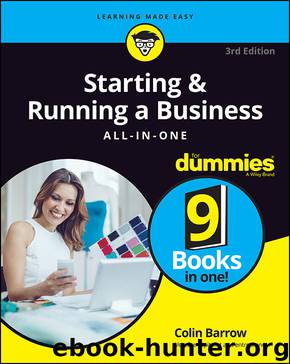Starting and Running a Business All-in-One For Dummies (For Dummies (Business & Personal Finance)) by Barrow Colin

Author:Barrow, Colin [Barrow, Colin]
Language: eng
Format: epub
ISBN: 9781119361022
Publisher: Wiley
Published: 2016-10-19T16:00:00+00:00
Although any of these financial crimes can happen in a small business, the one that hits small businesses the hardest is embezzlement. This crime happens most frequently when one person has access or control over most of the business’s financial activities. For example, a single bookkeeper may write cheques, make deposits and balance the monthly bank statement – talk about having your fingers in a very big till.
Dividing staff responsibilities
Your primary protection against financial crime is properly separating staff responsibilities when the flow of business cash is involved. Basically, never have one person handling more than one of the following tasks:
Bookkeeping: Involves reviewing and entering all transactions into the business’s books. The bookkeeper makes sure that transactions are accurate, valid, appropriate and have the proper authorisation. For example, if a transaction requires paying a supplier, the bookkeeper makes sure that the charges are accurate and someone with proper authority has approved the payment. The bookkeeper can review documentation of cash receipts and the overnight deposits taken to the bank, but shouldn’t actually make the deposit. Also, if the bookkeeper is responsible for handling payments from external parties, such as customers or suppliers, she shouldn’t enter those transactions in the books.
Authorisation: Involves being the manager or managers delegated to authorise expenditures for their departments. You may decide that transactions over a certain amount must have two or more authorisations before cheques can be sent to pay a bill. Spell out authorisation levels clearly and make sure that everyone follows them, even the owner or managing director of the business. (Remember, as owner, you set the tone for how the rest of the office operates; when you take shortcuts, you set a bad example and undermine the system you put in place.)
Dealing with suppliers: Involves making sure that you’re only paying for goods and services that you actually received. You can do this by only checking invoices against delivery notes/goods received notes to make sure you got the goods you’re being charged for. Also check off supplier invoices against their statements to make sure that you aren’t missing any invoices.
Money-handling: Involves direct contact with incoming cash or revenue, whether cheque, credit card or credit transactions, as well as outgoing cash flow. People who handle money directly, such as cashiers, shouldn’t also prepare and make bank deposits. Likewise, the person writing cheques to pay business bills shouldn’t be authorised to sign those cheques; to be safe, have one person prepare the cheques based on authorised documentation and a second person sign those cheques, after reviewing the authorised documentation.
When setting up your cash-handling systems, try to think like an embezzler to figure out how someone can take advantage of a system.
Download
This site does not store any files on its server. We only index and link to content provided by other sites. Please contact the content providers to delete copyright contents if any and email us, we'll remove relevant links or contents immediately.
Pioneering Portfolio Management by David F. Swensen(6289)
Man-made Catastrophes and Risk Information Concealment by Dmitry Chernov & Didier Sornette(6007)
Zero to One by Peter Thiel(5787)
The Motivation Myth by Jeff Haden(5205)
The Miracle Morning by Hal Elrod(4713)
Elon Musk by Ashlee Vance(4121)
Unlabel: Selling You Without Selling Out by Marc Ecko(3658)
The Art of Persistence: Stop Quitting, Ignore Shiny Objects and Climb Your Way to Success by Michal Stawicki(3648)
Delivering Happiness by Tony Hsieh(3418)
Urban Outlaw by Magnus Walker(3392)
Purple Cow by Seth Godin(3197)
The Marketing Plan Handbook: Develop Big-Picture Marketing Plans for Pennies on the Dollar by Robert W. Bly(3056)
Mastering Bitcoin: Programming the Open Blockchain by Andreas M. Antonopoulos(3035)
The Power of Broke by Daymond John(2975)
The Content Trap by Bharat Anand(2917)
Applied Empathy by Michael Ventura(2892)
The Airbnb Story by Leigh Gallagher(2851)
Keep Going by Austin Kleon(2756)
Radical Candor by Kim Scott(2715)
